

America's Original Sin: Slavery and the Legacy of White Supremacy. Generational amnesia: The memory loss that harms the planet - BBC Future. The Rhyme of History: Lessons of the Great War. Hough the era just before World War I, with its gas lighting and its horse-drawn carriages, seems very far off and quaint, it is similar in many ways—often unsettlingly so—to ours, as a look below the surface reveals.

The decades leading up to 1914 were, like our own time, a period of dramatic shifts and upheavals, which those who experienced them thought of as unprecedented in speed and scale. The use of electricity to light streets and homes had become widespread; Einstein was developing his general theory of relativity; radical new ideas like psychoanalysis were finding a following; and the roots of the predatory ideologies of fascism and Soviet communism were taking hold. July 1915: The battleship Missouri steams through the Panama Canal, one of three U.S. warships traversing the canal together that month. Keystone-France/Gamma-Keystone via Getty Images. Ten lessons of the Covid-19 pandemic. The second wave of Covid-19 is now truly upon us, and winter will be hard.

Yet for all the talk of the pandemic having changed the world, it’s arguably more true to say that it has acted as a lens to bring our global predicament into sharper focus. Important though it is to ask what we need, and what we can do better, to manage a public-health crisis of such enormity, we neglect the broader sociopolitical picture at our peril. As Philip Bobbitt, director of the Center for National Security at Columbia Law School, writes in Covid-19 and World Order (Johns Hopkins University Press), a pandemic like this was wholly predictable. Free exchange - Can too many brainy people be a dangerous thing? TEN YEARS ago Peter Turchin, a scientist at the University of Connecticut, made a startling prediction in Nature.
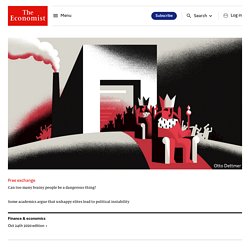
“The next decade is likely to be a period of growing instability in the United States and western Europe,” he asserted, pointing in part to the “overproduction of young graduates with advanced degrees”. The subsequent surge in populism in Europe, the unexpected votes in 2016 for Brexit and then for President Donald Trump in America, and a wave of protests from the gilets jaunes to Black Lives Matter, has made Mr Turchin something of a celebrity in certain circles, and has piqued economists’ interest in the discipline of “cliodynamics”, which uses maths to model historical change. Mr Turchin’s emphasis on the “overproduction of elites” raises uncomfortable questions, but also offers useful policy lessons. What causes these lurches from calm to chaos? Mr Turchin views societies as large, complex systems that are subject to certain patterns, if not laws. Why Children of Men haunts the present moment.
As the sound of the playgrounds faded, the despair set in.

Very odd what happens in a world without children’s voices.” I thought of these lines from Alfonso Cuarón’s film Children of Men in the days after the coronavirus pandemic sent Britain into lockdown. There’s a primary school across the road from where I live in East Sussex, which, before 23 March, came to life every day in a verbal free-for-all of innocent yelps and shrieks.
Incurable American Excess. A few years ago, Americans and Europeans were asked in a Pew Global Attitudes survey what was more important: “freedom to pursue life’s goals without state interference,” or “state guarantees that nobody is in need.”
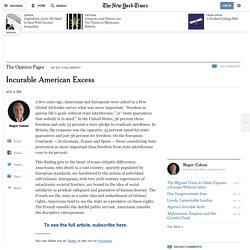
In the United States, 58 percent chose freedom and only 35 percent a state pledge to eradicate neediness. In Britain, the response was the opposite: 55 percent opted for state guarantees and just 38 percent for freedom. On the European Continent — in Germany, France and Spain — those considering state protection as more important than freedom from state interference rose to 62 percent. This finding gets to the heart of trans-Atlantic differences. Americans, who dwell in a vast country, sparsely populated by European standards, are hardwired to the notion of individual self-reliance. In his intriguing new book, “The United States of Excess,” Robert Paarlberg, a political scientist, cites the 2011 Pew survey as he grapples with these divergent cultures.
Ancient Philosophy Timeline. Horn History of the Ideas of Cybernetics and General Systems InfoMural. Our Machines Now Have Knowledge We’ll Never Understand. Mapping the decentralized world of tomorrow – Earlybird’s view – Medium. The Media is going crazy about Bitcoin, Ethereum and the rise of crypto markets.
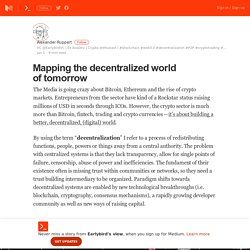
Entrepreneurs from the sector have kind of a Rockstar status raising millions of USD in seconds through ICOs. However, the crypto sector is much more than Bitcoin, fintech, trading and crypto currencies — it’s about building a better, decentralized, (digital) world. Apocalypse Soon: Has Civilization Passed the Environmental Point of No Return? Remember how Wile E.
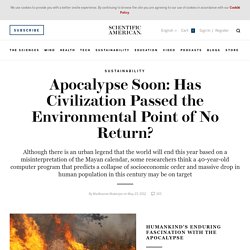
Coyote, in his obsessive pursuit of the Road Runner, would fall off a cliff? The hapless predator ran straight out off the edge, stopped in midair as only an animated character could, looked beneath him in an eye-popping moment of truth, and plummeted straight down into a puff of dust. Splat! Four decades ago, a Massachusetts Institute of Technology computer model called World3 warned of such a possible course for human civilization in the 21st century.
In Limits to Growth, a bitterly disputed 1972 book that explicated these findings, researchers argued that the global industrial system has so much inertia that it cannot readily correct course in response to signals of planetary stress. A Brief History of Blockchain: An Investor’s Perspective. After many friends and family members asked me to explain my investments in blockchain assets, I decided to write an email.
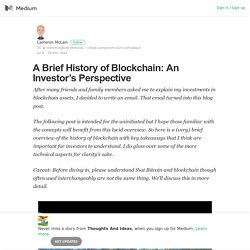
That email turned into this blog post. The following post is intended for the uninitiated but I hope those familiar with the concepts will benefit from this lucid overview. So here is a (very) brief overview of the history of blockchain with key takeaways that I think are important for investors to understand. Thoughts on Tokens – Balaji S. Srinivasan – Medium. In 2014, we wrote that “Bitcoin is more than money, and more than a protocol.
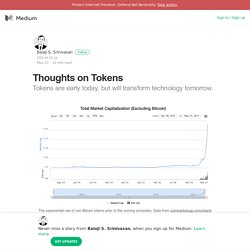
It’s a model and platform for true crowdfunding — open, distributed, and liquid all the way.” That new model is here, and it’s based on the idea of an appcoin or token: a scarce digital asset based on underlying technology inspired by Bitcoin. AI: Scary for the Right Reasons – Hacker Noon. Four global economic trends we need to take seriously. Economic competitiveness matters.
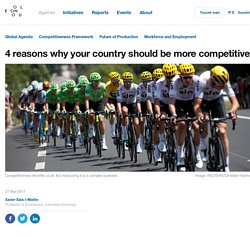
But not as an end in itself - it matters because nations that are more competitive are more productive, and are therefore more able to provide for the social needs of their people. The world has changed dramatically over the last decade, and measuring the factors that determine competitiveness continues to be a highly complex process. That’s why in order to calculate the World Economic Forum’s Global Competitiveness Index we use hundreds of different measures and consider many factors. It’s certainly true that the Fourth Industrial Revolution – new, rapidly changing technologies in many different fields – has changed the way we need to measure some aspects of competitiveness, particularly in relation to innovation and ideas. The challenging politics of climate change.
“We don’t really worry about climate change because it’s too overwhelming and we’re already in too deep. It’s like if you owe your bookie $1,000, you’re like, ‘OK, I’ve got to pay this dude back.’ But if you owe your bookie $1 million dollars, you’re like, ‘I guess I’m just going to die.’” — Colin Jost, Saturday Night Live, 10/13/18. No one knows when the COVID-19 pandemic will end. IfIf you’ve been marking the pandemic by the pileup of cautious reopenings and rescheduled events, you might think that an end to this global disaster is in sight. Event planners for the Kentucky Derby and Bonnaroo already have new opening days on the books in September. The Olympics are scheduled to start in Tokyo on July 23rd, 2021.
We’re not going back to normal. You can read our most essential coverage of the coronavirus/covid-19 outbreak for free, and also sign up for our coronavirus newsletter. But please consider subscribing to support our nonprofit journalism. Global China: Technology. Living into the 22nd century. At the beginning of each new year, UNICEF organizes a global campaign to celebrate the birth of the year’s first babies. This time, we cheered the arrival of 2020 and of a little over 392,000 new babies. The average life expectancy of a girl born today is 79.6 years—for a boy it is 76.2 years—which means that she and her peers will live to shape the rest of this century. Climate change, language and politics: How should we talk about what's happening to the planet? Revealed: This Is Palantir’s Top-Secret User Manual for Cops. There’s no scientific consensus that humanity is doomed.
Capitalism used to promise a better future. Can it still do that? Capitalism is intrinsically futuristic. The ideas that underpin market economies – growth, accumulation, investment – express an unspoken assumption, that tomorrow will be different, and probably better, than today. The question that murmurs through markets is not “What is good?” Capitalism is failing. People want a job with a decent wage – why is that so hard?
Milestones I Won't Live Long Enough to Witness. The Interpreter: The disturbing truth about authoritarianism's rise - skiplumley - Gmail. Good Enough: A lament for our benighted times. Toronto man finds a lasting living in cobbling. A Different Kind of Theory of Everything. Responsible competition and the future of U.S.-China relations. Meet the scientists who are training AI to diagnose mental illness. Is Big Tech Merging With Big Brother? Kinda Looks Like It. Generation Z Looks a Lot Like Millennials on Key Social and Political Issues. Among Republicans, Gen Z stands out in views on race, climate and the role of government. For $29, This Man Will Help Manipulate Your Loved Ones With Targeted Facebook And Browser Links. DARPA wants to build an AI to find the patterns hidden in global chaos. The Milky Way's Monster, Unveiled.
Why is democracy faltering? Future - Timeline of the far future. How Traveling Back In Time Could Really, Physically Be Possible. 17 striking findings for 2017. Fresh ideas on how to fix the world - Open Future. What the forgotten Americans really want−and how to give it to them. The Age of Perplexity. The History of the World: Every Year. The Birth of the New American Aristocracy. No one’s coming. It’s up to us. – Dan Hon.